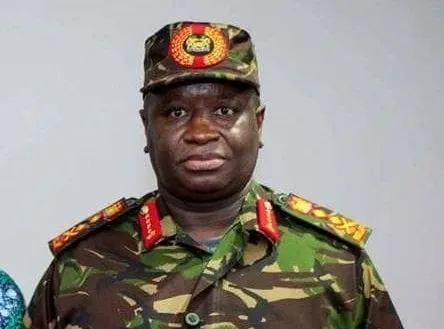- 27 March 2023
Maada Bio Not the Father of Sierra Leone Democracy

By Idriss Hamza Kamara
Lot of claims have been made by the Sierra Leone People’s Party (SLPP) that Julius Maada Bio is the Father of Sierra Leone’s democracy. This is not true, as historical facts debunk that assertion.
The following record gives clear and unambiguous facts that throw that claim and misleading assertion to the dustbin and the dump site.
The 1991 constitution was written under the Presidency of late Major General Joseph Saidu Momoh, which ushered in the multiparty democracy that is enjoyed today. After Momoh was overthrown, no new constitution has been written and voted for. An attempt was made to review it under the Presidency of Ernest Bai Koroma but this did not materialize. To date, we are still amending clauses of the constitution but have never replaced the 1991 constitution with any other constitution. The supremacy of the constitution continues to serve as a guide to the state and governmental undertakings.
Going through the historical background of Sierra Leone, it is crystal clear that President Julius Maada Bio has never been the father of democracy in Sierra Leone.
Historical Background
Sierra Leone, we all know, is a constitutional republic with a unicameral parliament and a directly elected president serving a five-year term with a maximum of two terms. Sierra Leone is a secular nation with the constitution providing for the separation of state and religion and freedom of conscience (which includes freedom of thoughts and religion). Muslims make up about three-quarters of the population, though with an influential Christian minority. Religious tolerance in the West African nation is very high and is generally considered a norm and part of Sierra Leone’s cultural identity.
Sierra Leone gained independence from the United Kingdom on 27 April 1961, and became a Commonwealth realm on the same day; the country’s name changed to the Dominion of Sierra Leone. Sir Milton Margai became Sierra Leone’s first prime minister.
During the few decades following independence, Sierra Leone witnessed an increase in political activities, transformations, turmoil, humanitarian and socio-economic crises. The country had its first general elections as an independent nation on 27 May 1961. Margai’s Sierra Leone People’s Party (SLPP) won a plurality of parliamentary seats and he was re-elected Prime Minister. A new constitution was adopted in 1971, paving the way for Sierra Leone to become a republic, and Siaka Stevens, leader of the All People’s Congress (APC), to become the first executive president of the Republic of Sierra Leone. Stevens held on to this position for 18 years (until 1985) under a one-party system of government facilitated by the controversial 1978 Constitution. However, Stevens’s hand-picked successor Joseph Saidu Momoh promised to return the country to a multi-party system, and a new constitution was adopted in 1991 that provided the means for a multi-party democracy. A brutal civil war broke out the same year, which went on for 11 years with devastating effects. In 1992, just a year after the war broke out, President Momoh was ousted in a coup led by Sierra Leone Army captain Valentine Strasser. Strasser was later ousted by his army colleague and second-in-command Julius Maada Bio, for failing to commit to a quick transfer to civilian rule (as alleged by the coup leader, Julius Maada Bio). Bio then returned the country to a democratic republic in 1996 through a general election held under the Proportional Representation (PR) system which was accepted primarily because of the war.
In early 1996, despite the country going through a brutal civil war, the emergence of the prospect of a transformation back to a multi-party democracy brought fresh hopes and great expectations among a majority of Sierra Leoneans, as the national debate “Peace before Elections vs Elections before Peace” became a hot topic. Eventually, “Elections before Peace” won the debate. The Late President Ahmad Tejan Kabbah won the 1996 presidential election and became the first multi-party democratically elected president of Sierra Leone. Since then, there has been a smooth succession to the presidency all via elections. A brief coup in 1997 led by Sierra Leone Army major Johnny Paul Koroma ousted President Kabbah, who went into exile in Guinea. He was reinstated after nine months through military intervention by ECOMOG. Kabbah’s presidency marked the dawn of a new Sierra Leone, which included the end of the civil war in 2002, a focus on fostering national unity and reconciliation, trust in government, peace and stability, the improvement in relations with many countries, and the re-establishment of the Sierra Leone Armed Forces with special assistance and training led by the Government of the United Kingdom.
About 18 ethnic groups inhabit Sierra Leone; the two largest and most influential ones are the Temne and Mende peoples. About 2% of the country’s population are Creole people, descendants of freed African-American and Afro-Caribbean slaves. English is the official language used in schools and government administration. Krio is the most widely spoken language across Sierra Leone, spoken by 97% of the country’s population. Sierra Leone is rich in natural resources, especially diamond, gold, bauxite and aluminium.
The country is a member of the United Nations, African Union, Economic Community of West African States (ECOWAS), Mano River Union, Commonwealth of Nations, IMF, World Bank, WTO, African Development Bank, and Organisation of Islamic Cooperation. Sierra Leone is home to sub-Saharan Africa’s first Western-style university: Fourah Bay College (established in 1827) which was referred to as the Athens of West Africa.
The brief historical background never mentioned Bio’s name as the father of Sierra Leone’s democracy. The election that brought the late Tejan Kabbah’s regime was conducted under the 1991 constitution. The three-month reign of Julius Maada Bio as a junta leader did not institute any new constitution whatsoever but governed by decree, interrupting the emergence of the 1991 Constitution.
